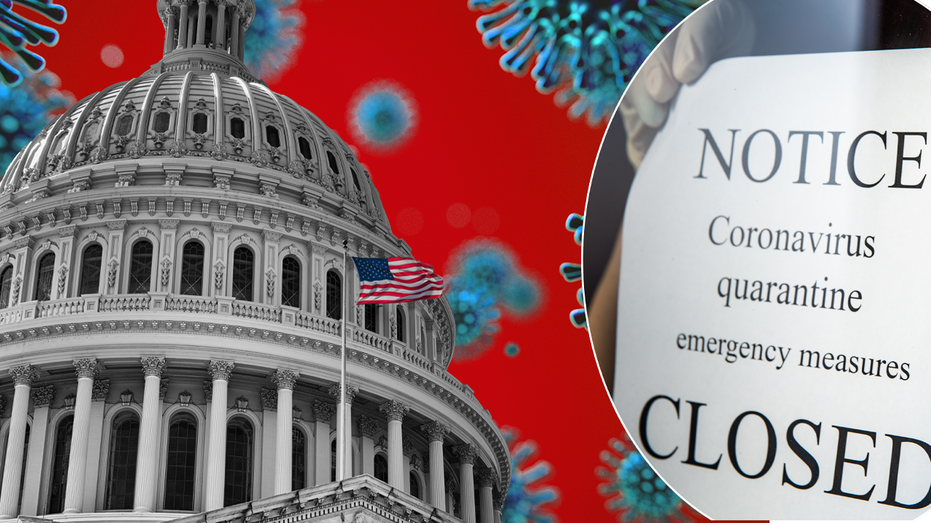US Constitution gives Congress power to cure economy from coronavirus shutdowns
'Since the coronavirus doesn't recognize state boundaries, that seems to give more power to the federal government'
The U.S. Constitution may have a cure for what ails the country’s economy.
Business has ground to a virtual standstill over the past month amid “stay-at-home” orders issued by more than 40 U.S. governors fighting the COVID-19 pandemic, forcing the temporary closure of shops and restaurants and bringing non-essential travel to a standstill.
More than 26 million workers have lost their jobs in just the past five weeks, and the major Wall Street banks all say the economy will contract by an annualized rate of at least 30 percent during the second quarter.
The dilemma has, in some ways, left the U.S. at odds with itself. As the coronavirus death toll mounts, a number of state governors are extending their “stay-at-home orders” into the middle of May, while a few others have begun moving to reopen their economies to curb the grinding cost of lost jobs and wages on taxpayers.
The disparity has created tensions between states and the Trump administration, which has urged rebooting the economy as rapidly as possible yet criticized Georgia for moving too quickly, and raised questions about which branch of government has the power to set a timetable.
NEXT WAVE OF CORONAVIRUS SMALL BUSINESS LOANS MAY START THIS WEEKEND
While the U.S. Constitution's intricate system of checks and balances makes that a tricky question, Congress can wield its power over interstate commerce to considerable effect, experts say. It can also use the power of the purse to offer incentives to states that move forward on Washington's timetable.
A governor can't say it's a crime for you not to distance or it's a crime for you not to stay at home. That has to be done by the legislature.
Under the commerce clause of the U.S. Constitution, Congress has the power to “regulate commerce with foreign nations, and among the several states, and with the Indian Tribes.”
That provision “gives Congress plenary power over interstate commerce, meaning full, final, needing nothing to complete it,” Judge Andrew Napolitano told FOX Business. “So Congress could open up the channels of interstate commerce so long as the president signed the legislation. But Congress cannot order Gov. Murphy in New Jersey to open up restaurants and state parks.”
CORONAVIRUS PRESSURES US MANUFACTURERS TO BRING PLANTS HOME FROM CHINA
Even then, however, the law is tricky. Because of the interconnectedness of the U.S. economy, it’s possible that restaurants could be opened under the commerce clause.
“Even though the Constitution says to regulate interstate commerce, that is commerce that goes from one state to another, the courts have allowed Congress to regulate intrastate state commerce as long as it has a direct relationship to interstate,” Napolitano said.
Neither President Trump nor any state governor has the power to order people to stay home, though.
“Generally, orders by governors or mayors, unless they're authorized by the legislature, are unenforceable by criminal law,” Alan Dershowitz, a professor emeritus at Harvard Law School, told FOX Business.
“A governor can't say it's a crime for you not to distance or it's a crime for you not to stay at home,” he added. “That has to be done by the legislature.”

Dershowitz said the more local an issue, the greater the authority afforded to state governments, and the more national and international an issue, the greater the power granted to the federal government.
For example, when it comes to schools, mayors and governors have a lot more sway than the federal government, Dershowitz said, adding that the federal government has dominance when it comes to airports, bus terminals or interstate commerce.
“Since the coronavirus doesn't recognize state boundaries, that seems to give more power to the federal government,” Dershowitz said.
There have even been instances where Congress has used its commerce power to regulate restaurants that serve products originating in other states.
While the Supreme Court has ruled Congress cannot force people or entities to engage in interstate commerce, the legislature can use its power to bribe or induce them to do so. Congress can also tax them if they don’t.
TRUMP SAYS US BEGINNING TO OPEN FOR BUSINESS AFTER CORONAVIRUS SHUTDOWNS
Because of the 10th Amendment, which grants authority over health, safety, welfare and morality issues to the states, and because of the concept of federalism, Congress cannot order the states to do things, but it can offer the states incentives to cooperate, according to Napolitano.
In this case, Congress could dangle bailout cash to states, and attach different types of strings, in exchange for them reopening their economies. States could either agree to reopen and take the money or keep their economies closed and reject the cash.
One wrinkle in that technique, however, is Senate Majority Leader Mitch McConnell, R-Ky., who doesn’t seem eager to bail out the states.
CLICK HERE TO READ MORE ON FOX BUSINESS
"We are not interested in revenue replacement for state governments," McConnell told Fox News. "We're interested in trying to help them with anything related to the coronavirus ... [but] we are not interested in solving their pension problems and all these other things that they would like for us to finance."




















